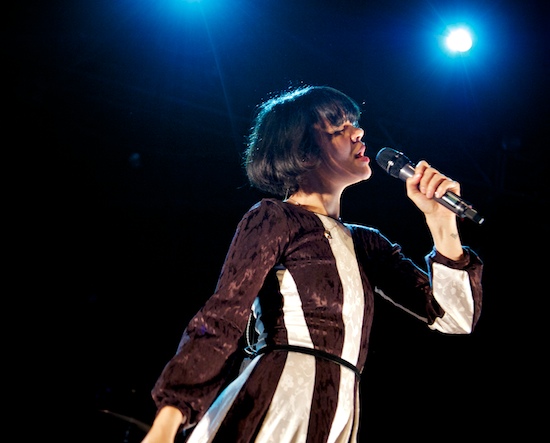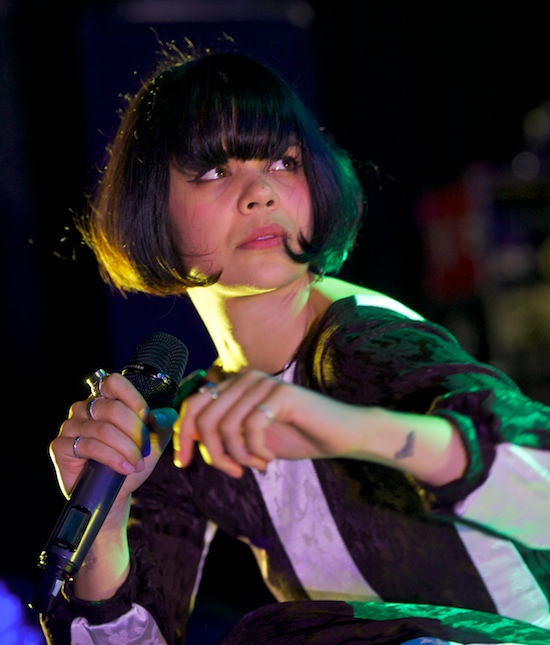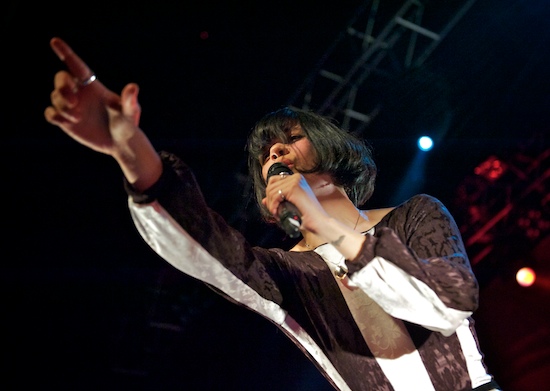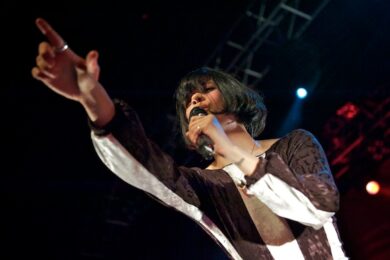In spite of its spectral title, Bat For Lashes’ latest album The Haunted Man is an optimistic record. While its roots lie in Natasha Khan feeling mired in a lack of ideas after touring her last album, 2009’s Two Suns, its three year gestation period has bred a confidence and, moreover, a major key resonance that underpins the record, expanding beyond the close, dark electro-pop of her previous work, and overwhelmingly present in the euphoric vocal lines that vein the album. She glances back into the past – family lineage, wartime – though this is tied to a sound that’s combative and resilient.
And it’s an upbeat Khan that strides onto the stage on the first of her two nights at the HMV Forum. "There are about a hundred of my family here tonight," she’ll say later, beaming broadly with a contentment that fuels the show.
The most immediate element is her voice. By the third chorus of set and album opener ‘Lilies’, she’s already vaulted registers with fluid ease. It’s not until ‘Glass’, the third song in, though, that she frees it from any lingering nerves: the chorus breaks, and her voice scythes through. It’s got an otherworldly quality to it, but feels stronger than that suggests; strident but without ever faltering into a cheapening melisma.
Her band, too, get it right. They realise her material faithfully to its studio fullness, and add subtle augmentations: the on-record background ambience of ‘Travelling Woman’ is amplified with bowed guitar and, later, ‘Daniel’ gets a coating of dance synth.
She plays a couple of cuts from The Haunted Man – ‘Oh Yeah’ and ‘All Your Gold’ – and the sense of artistic growth feels clear. The songs have more space in them, but conversely feel fuller than her previous work. They also seem to be the catalyst for Khan’s dancing: she’s a funny mover, self-possessed, jerking her body to every beat with almost choreographed rigour. While some members of the crowd reciprocate with a shoulder shimmy of their own, it also inspires people to improvise their own moves; one man shows his approval by raising a single hand in the air, occasionally angling it, bringing in an invisible plane from behind the stage for landing.
All the burnished metaphors, all the horses and suns, get set aside for momentarily as Khan introduces another new album cut, ‘Marilyn’. "This one’s for you, mum," says Khan. "Aw!" says the HMV Forum. The studio version’s matrix of synth lines and drum triplets are both present, but the sincerity comes through stronger live, swelled by the band’s delicate improvisatory embellishings.

The centrepiece of the night, probably rightly, is ‘Laura’. Everyone else barring pianist Ben Christophers leaves the stage, and four spotlights pinpoint Khan. The piano chords start, with Khan gesturing for them to be slower, lending them a stateliness, an apt footing for her paean to a friend desperately clinging onto ecstatic nights gone by.
The fervency of the performance remains through the lengthy applause, and gets taken up by ‘Siren Song’, Two Suns‘ best song. Again the piano is the focal point, but the song’s overarching crescendo builds and builds, before the drums topple in tumult, crashing brilliantly in tandem with blaring red/blue light flashes.
While the Kate Bush comparisons feel a little tired, the likeness is undeniable. Khan cleaves the air with sweeping hand movements, before rushing towards the cliff-face stage set, where the spotlight could just as easily be falling on a windswept heath. (Meanwhile, at the front the semaphore signals continue.)

However, Khan is her own artist. The electronics on the new album’s title track, the first of her two-song encore, gesture towards 80s synthpop, but are fully recalibrated and, laced with her voice, finding melodic pathways in scales seldom used elsewhere, become unique.
She closes with ‘Daniel’, a crowning cut for a set that feels like a homecoming. Again, where there’s sparseness on record, here it fleshes out, driven by snare snap and layers of synth patches. By the time the lights fade and the band depart, the words that ring most true are some of the first sung, ‘Lilies’ closing lines of "thank god I’m alive", a refrain that pays into the performance, one that feels flooded with replenished creativity.



